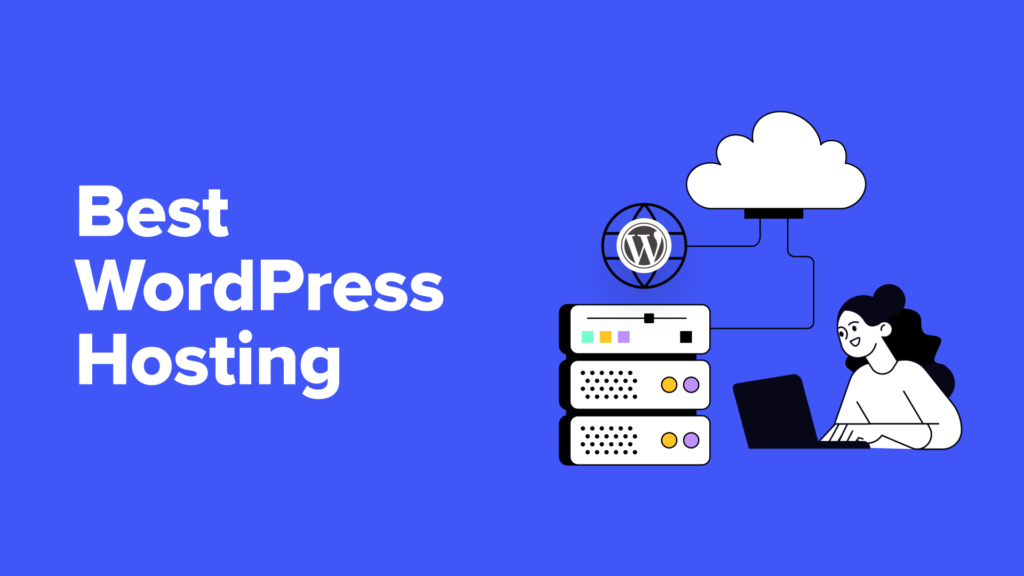Introduction
WordPress is the world’s most used Content Management System (CMS), running more than 40% of all websites on the Internet. Its simplicity and flexibility bring it close to every blogger’s, business’s, and developer’s heart. A WordPress site’s reliability, performance, and security, though, rely heavily on the hosting platform.
Native web hosting may not always provide the best environment for running a WordPress website efficiently. For a custom WordPress web designer in the UK, choosing managed hosting is essential for ensuring optimal performance, security, and seamless client experiences. Managed Hosting for WordPress is specifically optimized to enhance speed and streamline the WordPress process. It handles critical aspects like automatic updates, enhanced security, performance optimization, and premium support, allowing website owners to focus on their content and business rather than server management.
By choosing a Managed Hosting for WordPress service, WordPress users can benefit from improved site speed, reduced downtime, and a hassle-free hosting experience. This article explores the key aspects of managed WordPress hosting, its benefits, leading providers, and how to select the best option to ensure your website runs smoothly and efficiently.
What is Managed WordPress Hosting?
Managed WordPress hosting is a hosting service specifically designed for WordPress sites, where the hosting provider takes care of all the technical aspects, such as:
- Automatic Updates: Keeping WordPress, themes, and plugins up-to-date.
- Enhanced Security: Providing malware scanning, firewalls, and proactive threat detection.
- Optimized Performance: Using caching, Content Delivery Networks (CDNs), and high-performance servers.
- Daily Backups: Ensuring data safety with regular backups.
- Expert Support: Offering WordPress-specific support to troubleshoot issues quickly.

Advantages of Managed WordPress Hosting
1. Better Performance
Managed WordPress hosting companies tune their servers exclusively for WordPress to make pages load quickly, which enhances user experience and search engine rankings.
2. Improved Security Features
Security comes first, and managed hosting companies offer features like firewalls, malware scanning, DDoS protection, and automatic updates to avoid vulnerabilities.
3. Automatic Backups and Updates
Regular backups keep your website data safe, and automatic updates assist in maintaining WordPress secure and free of bugs.
4. Expert Support
Managed hosting companies provide specialized WordPress professionals who are on call 24/7 to handle technical problems and performance tuning.
5. Scalability
As your website increases in traffic and sophistication, managed hosting enables easy scalability without a loss of performance.
Also Read – 9 Best WordPress Hosting Providers Compared 2025
Key Features of Powerful Managed WordPress Hosting
- High-Performance Servers: Managed WordPress hosting providers use high-performance servers equipped with SSD storage, high-speed CPUs, and optimized database configurations to ensure websites run smoothly and efficiently.
- Global Content Delivery Network (CDN): A CDN helps distribute website content across multiple servers worldwide, reducing latency and ensuring fast load times for users regardless of their location.
- Built-in Caching Mechanisms: Server-side caching eliminates the need for third-party caching plugins, leading to faster page load speeds and improved performance.
- Automatic WordPress Updates: Ensuring security patches and new features are always applied, keeping your WordPress installation up to date and reducing vulnerabilities.
- One-Click Staging Environments: Staging environments allow website owners to test new updates, plugins, and design changes before deploying them to the live site, minimizing the risk of breaking the website.
- Robust Uptime Guarantee: Leading managed hosting providers offer a 99.9% or higher uptime guarantee, ensuring minimal downtime and uninterrupted website access.
- Enhanced Security Measures: Features such as firewalls, malware detection, DDoS protection, and proactive threat monitoring keep websites safe from cyber threats.
- Automatic Daily Backups: Managed hosting providers offer automated daily backups, allowing users to restore their site easily in case of data loss or accidental changes.
- Scalability and Flexibility: A good managed hosting service should allow seamless upgrades in server resources, ensuring websites can handle sudden traffic spikes without performance degradation.
- Developer-Friendly Features: Some managed WordPress hosting providers offer SSH access, Git integration, WP-CLI, and custom workflows for developers who require advanced website management tools.
Choosing the Best Managed WordPress Hosting Provider
Choosing the right managed WordPress hosting provider is crucial for the long-term success of your website. Here are the key factors to consider when selecting the best provider:
1. Performance and Speed
Look for hosting providers that offer SSD storage, server-level caching, and integration with CDNs to boost performance. Ensure they provide high-speed CPUs and optimized database configurations for seamless operations.
2. Security Features
Security is a major concern for any website. A good managed hosting provider offers built-in security measures such as SSL certificates, malware scanning, DDoS protection, and proactive monitoring. Check if they provide automated security updates to keep your website safe from vulnerabilities.
3. Support Quality
Reliable and expert support can make a huge difference in website management. Choose a hosting provider that offers 24/7 support via live chat, email, and phone. Look for teams with WordPress expertise to help troubleshoot issues quickly.
4. Scalability Options
If your website traffic increases, your hosting provider should be able to handle it. Look for a provider that offers easy scalability options, such as upgrading resources, cloud hosting solutions, and load balancing features to ensure seamless growth without downtime.
5. Backup and Disaster Recovery
A strong backup system is essential to prevent data loss. Check if the provider offers automated daily backups and a disaster recovery system to restore your website in case of unexpected issues.
6. Pricing and Value for Money
Managed WordPress hosting tends to be more expensive than shared hosting, but the features justify the cost. Compare different plans based on the resources offered, such as bandwidth, storage, and support. Ensure that the plan you choose provides the best value for your budget.
7. Ease of Use
A user-friendly interface makes website management easier. Choose a hosting provider that offers an intuitive control panel, one-click WordPress installations, and easy management tools to simplify your experience.
8. Free Site Migrations
If you’re moving from another host, check if the provider offers free migration services. Some managed hosting companies provide expert migration assistance to ensure a smooth transition with minimal downtime.
By evaluating these factors, you can find the best managed WordPress hosting provider that aligns with your website’s requirements, ensuring a seamless and high-performing online presence.

Best Managed WordPress Hosting Providers
1. Kinsta
- High-performance Google Cloud-powered hosting with robust security.
- Automatic scaling, daily backups, and 24/7 support.
- Premium service but relatively expensive.
2. WP Engine
- One of the leading providers of managed WordPress hosting.
- Enterprise-grade security, automatic updates, and developer tools.
- Has a range of pricing plans for varying requirements
3. SiteGround
- Low-cost managed WordPress hosting with great support.
- Integrated caching, security features, and CDN for free.
- Excellent performance and pricing balance.
4. Flywheel
- For freelancers and agencies.
- Free migrations, nightly backup, and collaborative features.
- Easy-to-use dashboard for managing sites.
5. Cloudways
- Cloud-based managed hosting with flexibility.
- Multiple cloud providers supported such as AWS, Google Cloud, and DigitalOcean.
- Excellent for developers who require high customization.
Also Read – 10 Reasons Why Small Businesses Should Choose WordPress
How to Migrate to Managed WordPress Hosting
Migration to managed WordPress hosting is a simple process, but it is important to plan carefully to avoid downtime or loss of data. The following are the major steps to facilitate a seamless migration:
1. Select a Managed Hosting Provider
Choose a provider that suits your needs best in terms of performance, security, support, and cost. Most managed hosting providers have free migration, so see if this can be availed.
2. Backup Your Website
Prior to any alterations, make a complete backup of your WordPress site, files and databases. You can use UpdraftPlus, BackupBuddy, or All-in-One WP Migration plugins to create backups.
3. Provider’s Migration Tool or Manual Migration
- Using Migration Tools: Managed hosting providers often have an integrated migration plugin or service. Applications such as Kinsta’s Site Migration, SiteGround Migrator, or WP Engine’s Automated Migration Plugin can streamline the process.
- Manual Migration: Alternatively, if you want to do it manually, upload your backup files to the new hosting company and import your database via phpMyAdmin. Update the wp-config.php file to include the new database credentials.
4. Test Your Website on the New Hosting
Once you have migrated, test your website extensively before going live. Make sure there are no broken links, missing pictures, or any functionality problems. You can utilize a temporary URL or staging area to ensure all is well and working as expected.
5. Update DNS Settings to Point to the New Server
Once you are satisfied that your site is functioning normally on the new hosting, switch your domain’s DNS settings to the new server’s IP address. This can take a few hours to update across the globe.
6. Track Performance and Troubleshoot
After migration, monitor your website’s speed, uptime, and security using tools like Google PageSpeed Insights, GTmetrix, and Pingdom. Address any performance or SEO issues that may arise due to the migration.

FAQ
1. What is managed WordPress hosting?
Managed WordPress hosting is a specialized hosting service designed for WordPress websites, providing optimized performance, security, and automated management features.
2. How is it different from shared hosting?
Managed WordPress hosting offers better speed, security, and dedicated WordPress support, unlike shared hosting, which hosts multiple websites on the same server.
3. Is managed WordPress hosting worth the cost?
Yes, if you need reliability, performance, and security. The additional cost is justified by the included optimizations and expert support.
4. Can I migrate my website to a managed WordPress host?
Most providers offer free website migration services, ensuring a smooth transition without downtime.
5. Does managed WordPress hosting include backups?
Yes, most providers offer automatic daily backups to protect your website from data loss.
Conclusion
Powerful managed WordPress hosting provides a reliable, secure, and high-performance solution for WordPress websites. Whether you’re a blogger, small business, or enterprise, or a WordPress web designer and developer in the UK, choosing the right managed hosting can significantly impact your site’s speed, security, and user experience.
By evaluating different providers based on performance, security, support, and pricing, you can find the best hosting solution tailored to your needs. Investing in a robust managed hosting provider ensures that your website remains fast, scalable, and protected from cyber threats. This, in turn, allows you to focus on content creation, business growth, and user engagement without worrying about server management or technical challenges.



